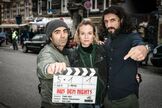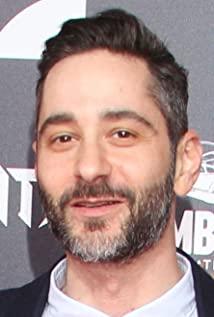Aus dem Nichts (2017), this is a German film. "Aus dem Nichts" is Google translated as "from nothing", and the English title of the film is In the Fade. He won the 75th Golden Globe Award for Best Foreign Language Film, the 70th Cannes Best Actress and several other awards. The story mainly tells that the neo-Nazis killed the Turkish husband and son, the German wife had a difficult lawsuit and lost the first trial... In the end, the German wife turned herself into a human bomb and perished with the neo-Nazis. It's been a while since I watched it, and I don't know what to say. Copy a sentence of lyrics, want to say but can't say, there are many more.
I've been reading Ray Dalio's "Principles" recently, and some of the content is really like a comment. The original text is excerpted below. Part II: Principles of Life 3 Be extremely open-minded 3. Know Your Two Big Obstacles Let's take a look at what happens when someone disagrees with you and asks you to explain your thinking. Because your brain is built to see such an approach as an attack, you become angry, although your more reasonable response would be to take an interest in the other side's perspective, especially if those perspectives are sensible. When you try to explain your angry behavior, the explanations are incomprehensible. This is because, when you are angry, it is the lower-level you who speaks through the higher-level you, and various hidden motivations embedded in your heart are controlling you, preventing you from rationally explaining "your" behavior. It's a shame that even the smartest people usually behave like this. To be effective, you must never allow the need to "want yourself to be right" to overwhelm the need to "find the truth." If you take too much pride in what you know and what you're good at, you'll learn less, make lower-quality decisions, and struggle to reach your full potential. Understand your thinking blind spot disorder. In addition to the self-awareness disorder, you (and everyone else) also have blind spots, where the way you think sometimes prevents you from seeing things accurately. … So naturally, people can’t understand what they can’t see. People who do not have the ability to recognize laws and comprehensive analysis do not know what the recognition laws and comprehensive analysis are about, just like a colorblind person who does not know how to distinguish colors. The differences in the functioning of the human brain are much less pronounced than the differences in the functioning of the human body. Colorblind people eventually find themselves colorblind, but most people never know, nor understand, why their way of thinking prevents them from seeing something. Complicating matters is the fact that while we all have blind spots, we don't want to see that fact. When you point out someone's psychological weakness, the other person usually reacts as uncomfortable as you point out a physical flaw. If you're like most people, you're not good at understanding the way other people see things, and you're not good at seeking out other people's ideas because you're preoccupied with telling them what you think is right. In other words, you are a closed-minded person with too many preconceptions. The price of closed-mindedness is extremely high: You turn a blind eye when others show you wonderful possibilities and dire threats; you fail to grasp when others offer potentially constructive or even life-saving criticism. The net result of these two hurdles is that parties in disagreement often remain convinced that they are in the right, often ending in anger at each other. This is irrational and leads people to be unable to make optimal decisions. people feel , when two people come to opposite conclusions, one must be wrong. You don't want that wrong person to be you, what's wrong with that? This inability to benefit from other people's ideas occurs not only when disagreements arise, but also when people encounter difficult problems. Most people try to figure something out in their own head instead of referring to all the good ideas they can get their hands on. The result is that they keep running towards what they see and keep hitting walls in their blind spots until failure forces them to adapt and evolve. There are three paths to adaptation and evolution: (1) training one's mind to think counter-intuitively (e.g. creative people become more organized through self-discipline and practice); (2) using auxiliary mechanisms (e.g. programmed reminders) device); (3) rely on the help of those who are good at your own shortcomings. Differences in ideas do not necessarily lead to divisiveness, but may also have complementary effects. ... In any complex program, no one can succeed without the help of those with complementary abilities. Aristotle defined tragedy as the terrible result of a fatal flaw in man. And if one could make up for the flaws, it could have brought good results. In my opinion, these two barriers, self-awareness and blind spots, are fatal flaws in people, preventing smart, hard-working people from reaching their full potential. Ray Dalio's "Principles" are aimed at individuals or organizations, how to use the principles, seek truth, and ultimately achieve their goals. For people or organizations that cannot adapt to the "principles", the answer he gives is to leave him or fire him. . There is nothing wrong with business principles, but for the "same world", it cannot be old and dead. "Will this world be good?" The "Principles" are aimed at individuals or organizations, how to use the principles, seek truth and survive and finally achieve their goals. For people or organizations that cannot adapt to the "principles", the answer he gives is to leave him or fire him. There is nothing wrong with business principles, but for the "same world", it cannot be old and dead. "Will this world be good?" The "Principles" are aimed at individuals or organizations, how to use the principles, seek truth and survive and finally achieve their goals. For people or organizations that cannot adapt to the "principles", the answer he gives is to leave him or fire him. There is nothing wrong with business principles, but for the "same world", it cannot be old and dead. "Will this world be good?" The "Principles" are aimed at individuals or organizations, how to use the principles, seek truth and survive and finally achieve their goals. For people or organizations that cannot adapt to the "principles", the answer he gives is to leave him or fire him. There is nothing wrong with business principles, but for the "same world", it cannot be old and dead. "Will this world be good?" The "Principles" are aimed at individuals or organizations, how to use the principles, seek truth and survive and finally achieve their goals. For people or organizations that cannot adapt to the "principles", the answer he gives is to leave him or fire him. There is nothing wrong with business principles, but for the "same world", it cannot be old and dead. "Will this world be good?"
View more about In the Fade reviews











